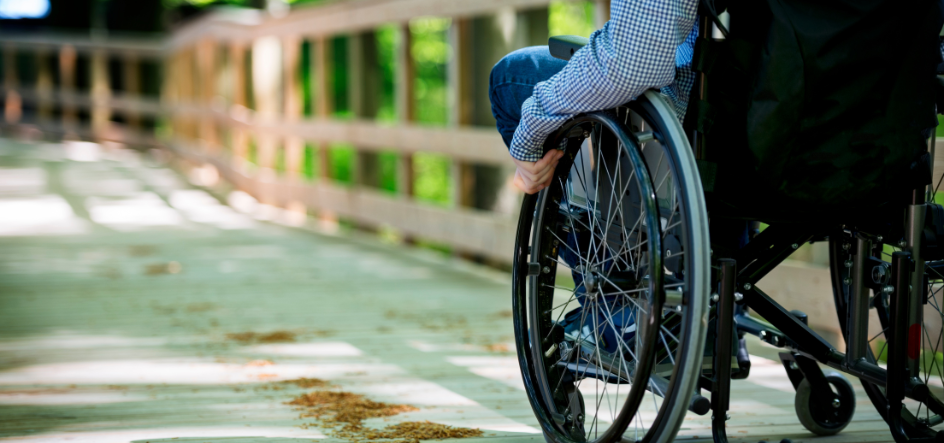Steve Potter is a 52-year-old Ontarian who sustained a spinal cord injury on the job as an industrial mechanic. Despite being covered by insurance, turning his home into a wheelchair accessible space has proven challenging.
“Insurance covers upgrades to your home if you are injured at work, but it’s a one-time thing, so if your needs change over time, you’re on your own,” shares Steve. “You get 85% of your earnings until the age of 65, but how do you survive after that, financially? It’s another detriment of what insurance expects of you.”
At the time of his injury, Steve and his family owned a town home. Since they couldn’t afford to buy another house, they made the decision to stay in the townhouse and work with the insurance company to upgrade everything and make it accessible for Steve.
“It was a very long journey,” shares Steve, “I spent about six months at Lyndhurst and after I was discharged, I had to find a place to stay because my home wasn’t accessible yet.”
This led Steve to a four-month stay at a retirement home, where, although he was significantly younger than his fellow residents, managed to form great relationships with the large Italian community within the home. “For a long time, I felt like ‘What on earth am I doing here? I don’t belong here; how on earth did I ever get here?’” says Steve, recalling the separation from his family and the ongoing meetings with his insurance company that were often stressful.
Eventually, a plan was formulated and Steve, along with his wife and children was able to stay at a Residence Hotel, equipped with a small kitchen. “It was a brutal three months and we couldn’t wait to get out. We were living in a hotel where my wife had to cook in a tiny kitchenette, and there was tons of noise and smoke coming in from people partying,” recalls Steve.
Meanwhile, meetings with insurance continued, with many changes to the plan along the way. “The changes were not for our benefit, they were for the benefit of the insurance company,” states Steve. “They wanted a stairlift to each floor which meant I would need four wheelchairs in total – I didn’t want that. They ended up building an elevator shaft in the backyard with a deck. There are automatic sliding doors. With the elevator, I am able to access every floor on my home – we had to fight for it, but it was worth it.”
Carpeting was also removed from the upper floors and hardwood floors were installed. “This was also something we had to fight for, because originally, they only wanted to put hardwood floors in the master bedroom, but carpet on the upper floors would have stopped me from entering my kids rooms,” shares Steve.
The family also fought for an additional bathroom in the basement, which was at first denied to them as insurance claimed it was outside of their scope of work and did not upgrade basements. After many back and forth discussions, Steve was able to have his basement renovated to make it fully accessible to him with a wheelchair. “I have a shower in there now too and it’s a game changer, because if I have to change while I’m down there or experience bladder problems, I don’t have to go all the way upstairs to have access to a washroom or shower,” he says.
Although it has been a long journey to getting an accessible home, Steve knows fully well that he is among the lucky ones with access to coverage by insurance. Still, dealing with the life changing trauma of a spinal cord injury, paired with fighting for basic needs in his home was a burdensome task. “I was in no position back then to argue with insurance and fight. I had just become a paraplegic and was dealing with so much already,” says Steve.
He shares that before any of the changes were made to his home, permission was needed from the Condo Corporation, which strictly stated that the structure of the outside cannot be changed. “If someone needs outside changes, they usually do not permit it, but because it was due to an injury and it posed a human rights issue, they had to go through with it,” he says.
“I love my home and there is nowhere else I’d rather be,” Steve shares. But there is a kicker. “Somewhere in the paperwork, they have outlined that accessibility needs are not sufficient to have my home the way it is now. I had to sign the papers that should I ever move, the home will be put back to its original state. From my perspective, this is a human rights issue, but we had no choice at the time. The elevator shaft has to be taken down and the roof for the shaft needs to be removed. So even though this is a perfect home for another wheelchair user, all of this work will eventually be undone, creating a cycle of difficulty for people with disabilities looking for a place to call home.”
And it doesn’t end there. “I also have to rent a permanent spot in the visitors parking because we share a driveway with the neighbors and I can’t fit if they are parked, because of the ramp. Insurance originally said they would cover this parking, but there is nothing in writing as of yet and I pay out of pocket.”
Steve touches on the fact that even if you have insurance, the struggles to achieve accessibility are still present; insurance companies do not have a thorough understanding of disability needs and are often looking to save money and time. Moreover, there are lawyer fees to work with the condo corporations for approval and the financial burden is extremely heavy.
“Everything is not perfect, but I have accessibility to my home and I’m happy,” shares Steve.


